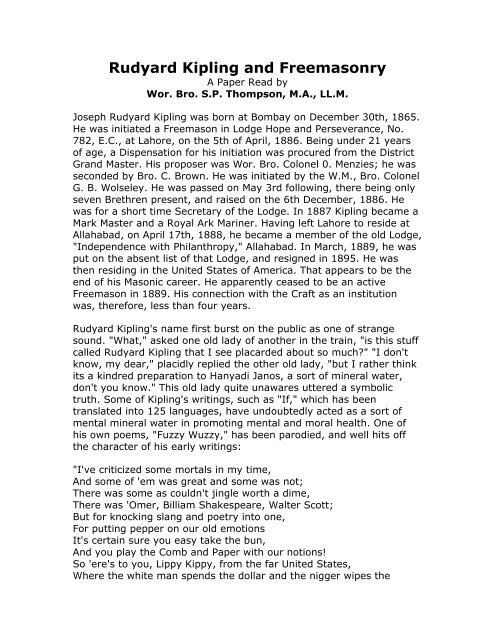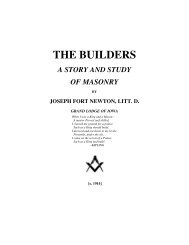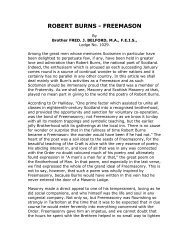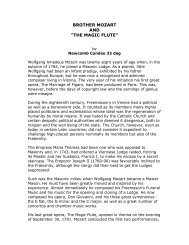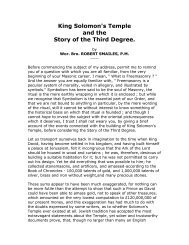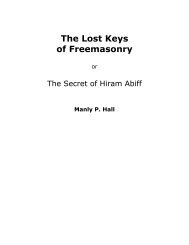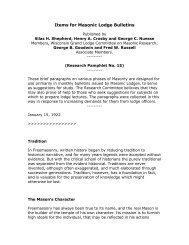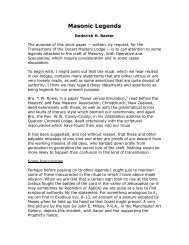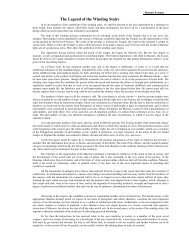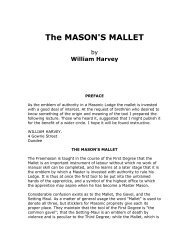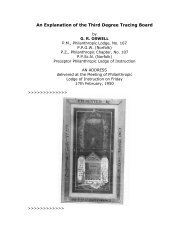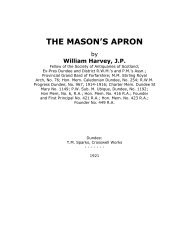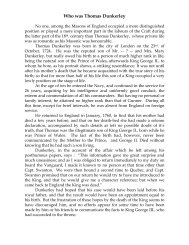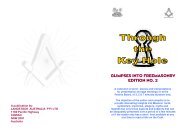Rudyard Kipling and Freemasonry - RoseCroix.org.au
Rudyard Kipling and Freemasonry - RoseCroix.org.au
Rudyard Kipling and Freemasonry - RoseCroix.org.au
You also want an ePaper? Increase the reach of your titles
YUMPU automatically turns print PDFs into web optimized ePapers that Google loves.
<strong>Rudyard</strong> <strong>Kipling</strong> <strong>and</strong> <strong>Freemasonry</strong>A Paper Read byWor. Bro. S.P. Thompson, M.A., LL.M.Joseph <strong>Rudyard</strong> <strong>Kipling</strong> was born at Bombay on December 30th, 1865.He was initiated a Freemason in Lodge Hope <strong>and</strong> Perseverance, No.782, E.C., at Lahore, on the 5th of April, 1886. Being under 21 yearsof age, a Dispensation for his initiation was procured from the DistrictGr<strong>and</strong> Master. His proposer was Wor. Bro. Colonel 0. Menzies; he wasseconded by Bro. C. Brown. He was initiated by the W.M., Bro. ColonelG. B. Wolseley. He was passed on May 3rd following, there being onlyseven Brethren present, <strong>and</strong> raised on the 6th December, 1886. Hewas for a short time Secretary of the Lodge. In 1887 <strong>Kipling</strong> became aMark Master <strong>and</strong> a Royal Ark Mariner. Having left Lahore to reside atAllahabad, on April 17th, 1888, he became a member of the old Lodge,"Independence with Philanthropy," Allahabad. In March, 1889, he wasput on the absent list of that Lodge, <strong>and</strong> resigned in 1895. He wasthen residing in the United States of America. That appears to be theend of his Masonic career. He apparently ceased to be an activeFreemason in 1889. His connection with the Craft as an institutionwas, therefore, less than four years.<strong>Rudyard</strong> <strong>Kipling</strong>'s name first burst on the public as one of strangesound. "What," asked one old lady of another in the train, "is this stuffcalled <strong>Rudyard</strong> <strong>Kipling</strong> that I see placarded about so much?" "I don'tknow, my dear," placidly replied the other old lady, "but I rather thinkits a kindred preparation to Hanyadi Janos, a sort of mineral water,don't you know." This old lady quite unawares uttered a symbolictruth. Some of <strong>Kipling</strong>'s writings, such as "If," which has beentranslated into 125 languages, have undoubtedly acted as a sort ofmental mineral water in promoting mental <strong>and</strong> moral health. One ofhis own poems, "Fuzzy Wuzzy," has been parodied, <strong>and</strong> well hits offthe character of his early writings:"I've criticized some mortals in my time,And some of 'em was great <strong>and</strong> some was not;There was some as couldn't jingle worth a dime,There was 'Omer, Billiam Shakespeare, Walter Scott;But for knocking slang <strong>and</strong> poetry into one,For putting pepper on our old emotionsIt's certain sure you easy take the bun,And you play the Comb <strong>and</strong> Paper with our notions!So 'ere's to you, Lippy Kippy, from the far United States,Where the white man spends the dollar <strong>and</strong> the nigger wipes the
plates;You've got your share of crocuses, an' if the colour suitsYou're welcome, Lippy Kippy, you can bet your blooniin' boots."<strong>Kipling</strong>'s works have always been good sellers, <strong>and</strong> his admirers aremany <strong>and</strong> enthusiastic. But he has also had some eminent <strong>and</strong> severedetractors. Among the latter is Arnold Bennett, who says that <strong>Kipling</strong>"is against progress," that "he is the shrill champion of things that arerightly doomed," that "his vogue among the hordes of the respectablewas due to political reasons," <strong>and</strong> that "he retains his <strong>au</strong>thority overthe said hordes bec<strong>au</strong>se he is the bard of their prejudices <strong>and</strong> of theirclayey ideals." "A democrat of ten times <strong>Kipling</strong>'s gift could never havecharmed <strong>and</strong> held the governing classes as <strong>Kipling</strong> has done." "Nordoes he conceive that the current psychology of ruling <strong>and</strong> managingthe earth will ever be modified. His simplicity, his naivete, hisenthusiasm, his prejudices, his blindness <strong>and</strong> his vanities are those ofStalky." "For <strong>Kipling</strong> the English l<strong>and</strong> system is perfect. He is incapableof perceiving that it can be otherwise." "The same semi-divine civilservice men sit equal with British military <strong>and</strong> naval officers on thehighest throne in the Kingdom of <strong>Kipling</strong>'s esteem." "His constitutionalsentimentality has corroded his stories in parts." It has been objectedby others that his stories of Anglo-Indian life are both flippant <strong>and</strong>cynical. He has been criticised for his Jingoism. Max Beerbohm depictshim as dancing a jig with Britannia upon Hampstead Heath, afterswopping hats with her. So much for the case of his adverse critics.His admirers say that he has brought together the farflung members ofthe British Empire as no other writer has done. One commentatorsays: "It would almost seem that his mission was to bind the BritishEmpire together in one blood-brotherhood, a purposive Masonic Lodge,whose business it is to cleanse the world of shoddy. It is said that "hisposition in English political thought <strong>and</strong> feeling is such as no otherEnglish imaginative writer – not even Milton – has ever occupied." Hismost strongly marked characteristic is energy. He glorifies the man ofaction above all men.However, I must not further dwell on <strong>Kipling</strong>'s merits <strong>and</strong> demerits asa writer of stories or as a poet. I am concerned with <strong>Kipling</strong> <strong>and</strong><strong>Freemasonry</strong>. What has he done for <strong>Freemasonry</strong> <strong>and</strong> what has<strong>Freemasonry</strong> done for him? Has he helped the Craft as an Institution?Has he furthered its ideals? Or has be merely exploited <strong>Freemasonry</strong>for his own purposes? I will put the evidence before you by quotationsfrom his writings.
The first story in which <strong>Kipling</strong> makes use of his Ma sonic knowledge is"The Man Who Would Be King," "Brother to a Prince <strong>and</strong> Fellow to aBeggar, if he be found worthy." Sir J. M. Barrie says that this story is"the most <strong>au</strong>dacious thing in fiction, <strong>and</strong> yet reads as true as"Robinson Crusoe." Other literary critics pronounce it <strong>Kipling</strong>'s bestshort story. The <strong>au</strong>thor, a pressman in a train journey, runs across twoFreemasons – down <strong>and</strong> out-Brother Peachey Carnehan <strong>and</strong> BrotherDaniel Dravot. The acquaintance is started by Carnehan accosting the<strong>au</strong>thor, <strong>and</strong> asking him to take a message to Dravot. "I ask you, as astranger going to the West," he said with emphasis. "Where have youcome from?" said I. "From the East," said he, "<strong>and</strong> I am hoping thatyou will give him the message on the Square – for the sake of myMother as well as your own." Later the two seek advice from the<strong>au</strong>thor, fit out an expedition, <strong>and</strong> proceed to an uncivilized districtbeyond Afghanistan called Kabistan. Summer passed <strong>and</strong> winterthereafter came <strong>and</strong> passed again. Then one night Brother Dravotburst into the press-office more dead than alive <strong>and</strong> tells his story. Ican only quote the chief Masonic references. "Peachey," says Dravot,"we don't want to fight no more. The Craft's the trick, so help me!"<strong>and</strong> he brings forth the Chief called Billy Fish. "Shake h<strong>and</strong>s with him,",says Dravot, <strong>and</strong> I shook h<strong>and</strong>s <strong>and</strong> nearly dropped, for Billy Fishgave me the grip. I said nothing, but tried him with the Fellowcraftgrip. He answers all right, <strong>and</strong> I tried the Master's grip, but that was aslip. "A Fellow-craft he is!" I says to Dan. "Does he know the word?""He does says Dan, "<strong>and</strong> all the priests know. It's a miracle! The chiefs<strong>and</strong> the priests can work a Fellow-craft Lodge in a way that's very likeours, <strong>and</strong> the 've cut the marks on the rocks, but they don't know theThird Degree, <strong>and</strong> they've come to find out. It's God's truth. I'veknown these long years that the Afghans knew up to the Fellow-craftDegree, but this is a miracle. A god <strong>and</strong> a Gr<strong>and</strong> Master of the Craftam I, <strong>and</strong> a Lodge in the Third Degree I will open, <strong>and</strong> we'll raise thehead priests <strong>and</strong> the chiefs of the villages.""It's against all the law," I says, "holding a Lodge without warrant fromanyone; <strong>and</strong> you know we never held office in any Lodge.""It's a master-stroke o' Policy," says Dravot. "I've forty chiefs at myheel, <strong>and</strong> passed <strong>and</strong> raised according to merit they shall be. Billetthese men in the villages <strong>and</strong> see that we run up a Lodge of somekind. The Temple of Imbra will do for the Lodge room. The womenmust make aprons as you show them.""I showed the priest's families how to make aprons of the degrees, butfor Dravot's apron the blue border <strong>and</strong> marks were made of turquoise
lumps on white hide, not cloth." They gave themselves out to beGr<strong>and</strong> Masters in the Craft. Peachey said: "I felt uneasy, for I knewwe'd have to fudge the Ritual, <strong>and</strong> I didn't know what the men knew.""The minute Dravot puts on the Master's apron that the girls had madefor him, the priest fetches a whoop <strong>and</strong> a howl, <strong>and</strong> tries to overturnthe stone that Dravot was sitting on.""It's all up now," I says. "That comes of meddling with the Craftwithout a Warrant!"They turn over the stone <strong>and</strong> find on the bottom the Master's Mark,same as was on Dravot's apron, cut into the stone. "Luck again," saysDravot, across the Lodge to me; "they say it's the missing Mark thatno one can underst<strong>and</strong> the why of. We're more than safe now." Thenhe bangs the butt of his gun for a gavel <strong>and</strong> says: "By virtue of the<strong>au</strong>thority vested in me by my right h<strong>and</strong> <strong>and</strong> the help of Peachey, Ideclare myself Gr<strong>and</strong> Master of all <strong>Freemasonry</strong> in Kafristan in this,the Mother Lodge, o' the country, <strong>and</strong> King of Kafristan equally withPeachey!" At that he puts on his crown <strong>and</strong> I puts on mine – I wasdoing Senior Warden – <strong>and</strong> we opens the Lodge in most ample form. Itwas an amazing miracle! The priests moved in Lodge through the firsttwo Degrees almost without telling, as if the memory was coming backto them. After that, Peachey <strong>and</strong> Dravot raised such as was worthy –high priests <strong>and</strong> Chiefs of far-off villages. Billy Fish was the first, <strong>and</strong> Ican tell you we scared the soul out of him. It was not in any wayaccording to Ritual, but it served our turn. We didn't raise more thanten of the biggest men, bec<strong>au</strong>se we didn't want to make the Degreecommon."Their rule was thus established, <strong>and</strong> Dravot says: "I'll write for adispensation from the Gr<strong>and</strong> Lodge for what I've done as Gr<strong>and</strong>Master." Later Billy Fish says: "We thought you were men till youshowed the sign of the Master.""I wished then," says Peachey, "that we had explained about the lossof the genuine secrets of a Master Mason at the first go-off."Trouble comes through Dravot taking to wife a girl, who bites him,draws blood, <strong>and</strong> thus he is then no longer regarded as a god. Wildcommotion arises <strong>and</strong> Dravot is killed. Peachey escapes with Dravot'shead. At the conclusion of his story he shakes from a bag on the<strong>au</strong>thor's table – the dried, withered head of Daniel Dravot. "You knewDravot, Sir! You knew Right Worshipful Brother Dravot! Look at himnow." Peachey dies next day in the asylum.
In the long story, "Kim," the hero is introduced with a Masonicreference. Kim's father, Kimball O'Hara, a young colour-sergeant ofthe Mavericks, an Irish regiment, fell to drink <strong>and</strong> loafing, <strong>and</strong> later toopium, <strong>and</strong> died as poor whites die in India. "His estate at death," it isrelated, "consisted of three papers – one he called "ne varietur",bec<strong>au</strong>se those words were written below his signature thereon, <strong>and</strong>another his 'clearance certificate.' The third was Kim's birth-certificate.Those things, he was used to say, in his glorious opium hours, wouldyet make little Kimball a man. On no account was Kim to part withthem, for they belonged to a great piece of magic such magic as menpractised over yonder behind the Museum, in the big blue <strong>and</strong> whiteJadoo-Gher --the Magic House, as we name the Masonic Lodge. , Itwould, he said, all come right some day, <strong>and</strong> Kim's horn would beexalted between pillars – monstrous pillars -- of be<strong>au</strong>ty <strong>and</strong> strength."W<strong>and</strong>ering about India with an old lama, Kim runs into his father'sregiment, <strong>and</strong> is questioned by the two Chaplains, one Bennett beingSecretary to the regimental Masonic Lodge. Says Kim: "My father, hegot these papers from the Jadoo-Gher – what do you call that? –bec<strong>au</strong>se he was in good st<strong>and</strong>ing." Then Chaplain Bennett, "Assumingthat he is the son of a Mason, the sooner he goes to the MasonicOrphanage the better!""Ah! that's your opinion as Secretary to the Regimental Lodge," saidFather Victor. The matter of Rivers of Healing, Red Bulls <strong>and</strong> MasonicCertificates goes for consideration to the Colonel. "Are you a Mason byany chance?" says Father Victor."By Jove, I am, now I come to think of it.""That's an additional reason," said the Colonel, absently. So Kim isclothed <strong>and</strong> educated at Masonic expense."Kim" is a story that all should read. The theme of the story – thesearch for the Red Bull on the green field of Kim, the Little Friend of allthe World, <strong>and</strong> the Lama's search for his river of purification – mightwell have been inspired by the Masonic idea of the search for the lostword.In the medieval story, "The Wrong Thing," <strong>Kipling</strong> has <strong>Freemasonry</strong>running in his thoughts. The story is of an ancient builder of a villagehall. Hal o' the Draft is asked if he wants a job. "No, faith!" he said,"only the Hall is as good <strong>and</strong> honest a piece of work as I've ever run arule over. So, being born hereabouts, <strong>and</strong> being reckoned a masteramong masons, <strong>and</strong> accepted as a master mason, I made bold to pay
my brotherly respects to the builder." "Aa-um!" Mr. Springett lookedimportant. "I be a bit rusty, but I'll try ye!" He asked Hal severalcurious questions; <strong>and</strong> the answers must have pleased him, for heinvited Hal to sit down." . . . A further passage reads: "Hal pointed to awhite scar on his cheek-bone. 'This is a remembrance from the MasterWatching Foreman of Masons on Magdalan Tower, bec<strong>au</strong>se, pleaseyou, I dared to carve stone without their leave. They said a stone hadslipped from the cornice by accident.' 'I know them accidents. There'sno way to disprove 'em. An' stones ain't the only things that slip,' Mr.Springett grunted. Still another passage reads: 'I pledge you my MarkI never guessed it was the King till that moment.' 'I would not put outbad work before I left the Lodge.' Hal tells the Master of his strugglewith Benedetto. 'Ah,' says the Master, shaking his finger. 'Benedetto, ifyou had killed my Hal I should have killed you – in the cloister. Butyou are a craftsman, too, so I should have killed you like a craftsman,very, very slowly – in an hour, if I could spare the time!' That wasTorrigiano, the Master."In Roman times the Order of Mithras was akin to <strong>Freemasonry</strong>. Thereis a reference in the story, "On the Great Wall." "We came to knoweach other at a ceremony in our Temple in the dark. Yes – in the Cavewe first met, <strong>and</strong> we were both raised to the Degree of Gryphonstogether. Parnesius lifted his h<strong>and</strong> toward his neck for an instant."In the same volume, in "The Winged Hats," we find this passage: "As Istopped, I saw he wore such a medal as I wear. Parnesius raised hish<strong>and</strong> to his -neck. Therefore, when he could speak, I addressed him acertain question, which can only be answered in a certain manner. Heanswered with the necessary word – the word that belongs to theDegree of Grypbons in the science of Mithras, my God. I put my shieldover him till he could st<strong>and</strong> up. He said, ‘What now?' I said, ‘At yourpleasure, my brother, to stay or go?'" (He was a member of anattacking party of Vikings, whose life Parnesius saved.) "I know thatthose who worship Mithras are many, <strong>and</strong> of all races, so I did notthink much more upon the matter.A month later I saw Allo with his horses – by the Temple of Pan – <strong>and</strong>he gave me a great necklace of gold studded with coral. At first Ithought it was a bribe from some tradesman of the town – meant forold Rutilianus. 'Nay,' said Allo. 'This a gift from Amal, that Winged Hatwhom you saved on the beach. He say -- you are a Man."'Fort Newton suggests that <strong>Kipling</strong>'s Masonic references are toorevealing. The following are,, some samples that might be so
egarded. This from "With the Main Guard." "‘Knee to knee!' sings outCrook, with a l<strong>au</strong>gh, when the rush av our comin' into the gutshtopped, an' he was huggin' a hairy great Paythan, neither bein' ableto do anything to the other, tho' both was wishful. ‘Breast to breast!'he says, as the Tyrone was pushin' us forward, closer an' closer. ‘Anh<strong>and</strong> over back!' sez a sarjint that was behin'. I saw a sword lick outpast Crook's ear like a snake's tongue, an' the Paythan was took in theapple av his throat like a pig at Dromean Fair. ‘Thank ye, BrotherInner- Guard,' sez Crook, cool as a cucumber widout salt. ‘I wantedthat room.' An' he went forward by the thickness av a man's body,havin' turned the Paythan undher him. The man bit the heel offCrook's boot in his death-bite."And this from "Brother Square-Toes": "I saw my chief's war-bonnetssinking together down <strong>and</strong> down. Then they made the sign which noIndian makes outside of the Medicine Lodges – a sweep of the righth<strong>and</strong> just clear of the dust <strong>and</strong> an inbend of the left knee at the sametime, <strong>and</strong> those proud eagle feathers almost touched his boottop."This is from "The Dog Hervey": "What's that dog doing? A tremorshook him, <strong>and</strong> be put his h<strong>and</strong> on my knee, <strong>and</strong> whispered with greatmeaning, ‘I'll letter or halve it with you. There! You begin!' ‘S,' said I,to humour him, for a dog would most likely be st<strong>and</strong>ing or sitting, or,may be, scratching or sniffing or staring. ‘Q,' he went on, <strong>and</strong> I couldfeel the heat of his shaking h<strong>and</strong>. ‘U', said I. There was no other letterpossible; but I was shaking, too. ‘I,' ‘N,' ‘T-i-n-g,' he ran out. ‘There!that proves it. I knew you knew him. Between ourselves, old man, hehe'sbeen turning up lately a-a damn sight more often than I cared for.And a squinting dog – dog that squints! I mean that's a bit too much."In 1926 <strong>Kipling</strong> published a volume called "Debits an Credits." In itthere are no less than four Masonically inspired stories, all fouremanating from the imaginary London Lodge, Faith <strong>and</strong> Works, No.5837, E.C. The stories are entitled "In the Interests of the Brethren,""The Janeites," "A Madonna of the Trenches," <strong>and</strong> "A Friend of theFamily." The characters are all soldier Freemasons. "In the Interests ofthe Brethren," first published in the 1918 Christmas issue of the"Storyteller," is all Masonic, being a record of the doings at a specialLodge of Instruction held two afternoons <strong>and</strong> two evenings each weekfor soldiers sick <strong>and</strong> on leave during the War. You must read the storyfor yourselves. There is a good deal about Ritual in it. I can only giveyou a few extracts. "Now a Lodge of Instruction is mainly a paradeground for Ritual." "All Ritual is fortifying. Ritual's a natural necessityfor mankind. The more things are upset, the more they fly to it. I
abhor slovenly Ritual anywhere." "The Dominions are much keener onritual than an average English Lodge." "When the amateurs, rather red<strong>and</strong> hot, had finished, they dem<strong>and</strong>ed an exhibition working of theirbungled ceremony by Regular Brethren of the Lodge. Then I realisedfor the first time what word-<strong>and</strong>-gesture-perfect-Ritual can be broughtto mean. We all appl<strong>au</strong>ded, the one-footed Corporal most of all."Then Masonry as a religion is commented on. "Brother Burgessstarted. He told us sleepy old chaps in Lodge that what men wantedmore than anything else was Lodges where they could sit <strong>and</strong> behappy like we are know. He was right, too. A man's Lodge meansmore to him than people imagine. As our friend on your right said justnow, very often Masonry's the only practical creed we've ever listenedto since we were children. Platitudes or no platitudes, it squares withwhat everybody knows ought to be done.' He sighed. 'And if this warhasn't brought home the Brotherhood of Man to us all, I'm – a Hun!'"The one-footed R.A.M.C. on my right chuckled. 'D'you like it?' said theDoctor to him. 'Do I? It's Heaven to me, sittin' in Lodge again. It's allcoming back now, watching their mistakes. I haven't much religion,but all I had I learnt in Lodge.' Recognising me, he flushed a little asone does when one says a thing twice over in another's hearing. 'Yes,"veiled in all'gory <strong>and</strong> illustrated in symbols" – the Fatherhood of God,an' the Brotherhood of Man; an' what more in Hell do you want? Lookat 'em!' He broke off, giggling. 'See! See! They've tied the whole thinginto knots.'""We could do much with Masonry," says the SergeantMajor (who wasa Past District Gr<strong>and</strong> Lodge Officer). "As an aid – as an aid – not as asubstitute for Religion," the Clergyman snapped. "Oh, Lord! Can't wegive Religion a rest for a bit?" the Doctor muttered. "It hasn't done so– I beg your pardon all round." The Clergyman was bristling."Kamerad!" the wise Sergeant-Major went on, both h<strong>and</strong>s up."Certainly not as a substitute for a creed, but as an average plan oflife. What I've seen at the front makes me sure of it." Says BrotherBurgess: "All London's full of the Craft, <strong>and</strong> no places for them to meetin. Think of the possibilities of it. Think what could have been done byMasonry through Masonry for all the world. I hope I'm not censorious,but it sometimes crosses my mind that Gr<strong>and</strong> Lodge may have thrownaway its chance in the war almost as much as the Church has." "Luckyfor you the Padre is taking that chap to King's Cross," said BrotherLemming.
It is an interesting story with soldiers from all over the world droppingin. "Listen to the greetings. They'll be interesting. The crack of thegreat gavel brought us to our feet, after some surging <strong>and</strong> plungingamong the cripples. Then the Battery-Sergeant-Major, in a trainedvoice, delivered hearty <strong>and</strong> fraternal greetings to 'Faith <strong>and</strong> Works'from his tropical District <strong>and</strong> Lodge. The others followed, in every tonebetween a grunt <strong>and</strong> a squeak. I heard 'H<strong>au</strong>raki, 'Inyanga-Umbezi,''Aloha,' 'Southern Lights' (from somewhere Punta Arenas way), 'Lodueof Rough Ashlars' (<strong>and</strong> that Newfoundl<strong>and</strong> Naval Brother looked it),two or three stars of something or other, half-a-dozen cardinal virtues,variously arranged, hailing from Klondyke to Kalgoorlie, one MilitaryLodge on one of the fronts, thrown in with a severe Scotch burr by myfriend of the head-b<strong>and</strong>ages, <strong>and</strong> the rest as mixed as the Empireitself."The soldiers arriving have to be tested. "They come all shapes.""Shapes was not a bad description, for my first patient was all headb<strong>and</strong>ages-- escaped from an Officers' Hospital, Pentonville way. Heasked me in profane Scots how I expected a man with only six teeth<strong>and</strong> half a lower lip to speak to any purpose, so we compromised onthe signs. My last man nearly broke me down altogether. Everythingseemed to have gone from him. 'I don't blame you,' he gulped, at last.I wouldn't pass my own self on my answers, but I give you my wordthat so far as I've had any religion, it's been all the religion I've had.For God's sake, let me sit in Lodge again, Brother!"'"The Janeites" – devotees of Jane Austen, the novelists – is a story ofthe trenches. It is told at a Saturday afternoon cleaning up of regaliaat Lodge Faith <strong>and</strong> Works. Visiting Brethren are helping "to polishColumns, Jewels, Working Outfit <strong>and</strong> Organ." "A morose, one-leggedBrother was attending to the Emblems of Mortality with, I think,rouge." "They ought," he volunteered to Brother Burgess as wepassed, "to be between the colour of ripe apricots an' a half-smokedmeersch<strong>au</strong>m. That's how we kept 'em in my Mother Lodge – a treat tolook at." The teller of the story states: " 'E'd never gone beyond theBlue Degrees, 'e told me." "For one pound he con-imunicated me thepassword of the First Degree, which was Tilniz an' trap-doors.""A Madonna of the Trenches" is a story of a shell-shocker – Brother C.Strangwick, a young, tallish, new-made Brother. "I noticed that, afterLodge-working, Keede (a Doctor <strong>and</strong> Senior Warden) gave him a seata couple of rows in front of us, that he might enjoy a lecture on the'Orientation of King Solomon's Temple,' which an earnest Brotherthought would be a nice interlude between labour <strong>and</strong> the high tea
that we called our 'Banquet.' Even helped by tobacco it was a drearyperformance. About half-way through, Strangwick, who had beenfidgeting <strong>and</strong> twitching for some minutes, rose, drove back his chair,grinding across the tesselated floor, <strong>and</strong> yelped: 'Oh, my Aunt! I can'tst<strong>and</strong> this any longer.' Under cover of a general l<strong>au</strong>gh of assent hebrushed past us <strong>and</strong> stumbled towards the door. Keede gets him in theTyler's Room, gives him sal volatile, <strong>and</strong> he is induced to tell his story<strong>and</strong> thus obtain relief.""A Friend of the Family" is a story told after "rather a long sitting atLodge Faith <strong>and</strong> Works, 5837, E.C. Three initiations <strong>and</strong> two raisings,each conducted with the spaciousness <strong>and</strong> particularity that our Lodgeprides itself upon, made the Brethren a little silent, <strong>and</strong> the strains ofcertain music had not yet lifted from them." It is a story of somedoings of an Australian soldier – a Queensl<strong>and</strong> drover from thebackblocks. The story is an extremely good one. We are told – "TheAustralian was full of racial grievances as must be in a young country;alternating between complaints that his people had not beenappreciated enough in Engl<strong>and</strong>, or too fulsomely complimented by anhysterical Press." "What your crowd down under are suffering from isgrowing-pains. You'll get over 'em in three hundred years or so – ifyou're allowed to last so long...... Who's going to stoush us?" Orton(an Australian) asked fiercely. After the story is told the teller says:"I've given it you just as it happened, word for word. I'd hate to havean Australian have it in for me for anything I'd done to his friend. Markyou, I don' say there's anything wrong with you Australians, BrotherOrton. I only say they ain't like us, or anyone else I know."Several passages in <strong>Kipling</strong>'s "Letters of Travel" reveal his interest in<strong>Freemasonry</strong>. He tells how in the native town of Penang he found alarge army of Chinese encamped in spacious street <strong>and</strong> houses. TheseChinese were said to have the town entirely at their mercy. They wereb<strong>and</strong>ed in secret societies. <strong>Kipling</strong> went to a Chinese theatre <strong>and</strong> cameto the conclusion that they were without nerves as without digestion.He concludes in these words: "About this time the faces of the Chinesefrightened me more than ever, so I ran away to the outskirts of thetown <strong>and</strong> saw a windowless house that carried the Square <strong>and</strong>Compasses in gold <strong>and</strong> teakwood above the door. I took heart atmeeting these familiar things again, <strong>and</strong> knowing that where theywere was good fellowship <strong>and</strong> much charity, in spite of all the secretsocieties in the world. Penan- is to be congratulated on one of theprettiest little lodges in the East."
In an account of his visit to Salt Lake City he comments: "To quenchher (the white woman) "most natural rebellion, that amazing creed<strong>and</strong> fantastic jumble of Mahometanism, the Mosaical law <strong>and</strong>imperfectly comprehended fragments of <strong>Freemasonry</strong>, calls to its aidall the powers of a hell conceived <strong>and</strong> elaborated by coarse-mindedhedgers <strong>and</strong> ditchers." "There is over the main door" (of the Temple)"some pitiful scratchings in stone representing the all-seeing eye, theMasonic grip, the sun, moon <strong>and</strong> stars, <strong>and</strong> perhaps other skittles." Inanother place – "Canada possesses two pillars of Strength <strong>and</strong> Be<strong>au</strong>tyin Quebec <strong>and</strong> Victoria."Turning to <strong>Kipling</strong>'s verse, the earliest Masonic reference is, I think, inThe Widow at Windsor"H<strong>and</strong>s off o' the sons o' the Widow,H<strong>and</strong>'s off o' the goods in 'er shop,For the Kings must come down an' the Emperors frownWhen the Widow at Windsor says "Stop!"Then 'ere's to the Lodge o' the Widow.From the Pole to the Tropics it runs--To the Lodge that we tile with the rank an' file.An' open in form with the guns.Then 'ere's to the sons o' the Widow,Wherever, 'owever they roam,Ere's all they desire, an' if they requireA speedy return to their 'ome."The Press."The soldier may f<strong>org</strong>et his sword,The sailorman the sea,The Mason may f<strong>org</strong>et the WordAnd the Priest his litany."You no doubt know "The Mother Lodge"-"We hadn't good regalia,An' our Lodge was old an' bare,But we knew the Ancient L<strong>and</strong>marksAn' kep' 'em to a hair."Full oft on Guv'ment serviceThis rovin' foot 'ath pressed,An' bore fraternal greetingsTo the Lodges East <strong>and</strong> West."In the volume, "Debits <strong>and</strong> Credits," we have
Banquet Night."So it wis ordered <strong>and</strong> so it was done,And the heavens of wood <strong>and</strong> the Masons of Mark,With foc'sle h<strong>and</strong>s of the Sidon run;And Navy Lords from the Royal ArkCame <strong>and</strong> sat down <strong>and</strong> were merry at messAs Fellow-Craftsmen – no more <strong>and</strong> no less.""Brother to Beggars <strong>and</strong> Fellow to Kings,Companion of Princes – f<strong>org</strong>et these things!Fellow-Craftsmen, f<strong>org</strong>et these things!"Then there is "My New-cut Ashlar":"My new-cut ashlar takes the lightWhere crimson-blank the windows flare;By my own work, before the night,Great Overseer, I make my prayer.--- ---One stone the more swings to its placeIn that dread temple of Thy Worth;It is enough that through Thy graceI saw n<strong>au</strong>ght common on Thy earth.Take not that vision from my ken;Oh, whatsoe'er may spoil or speed,Help me to need no help from menThat I may help such men as need.""The Sons of Martha" appeals to the Freemason as Masonicallyinspired:"They say to Mountains, 'Be ye removed.' They say to the lesser floods'Be dry.'Under their rods are the rocks reproved – they are not afraid of thatwhich is high."Not as a ladder from earth to Heaven, not as a witness to any creed,Put simple service simply given to his own kind in their common need."They do not teach that their God will rouse them a little before thenuts work loose;They do not preach that His Pity allows them to leave their work whenthey damn-well choose.As in the thronged <strong>and</strong> lighted ways, so in the dark <strong>and</strong> the desert
they st<strong>and</strong>,Wary <strong>and</strong> watchful all their days, that their Brethren's days may belong in the l<strong>and</strong>."The Palace."When I was a King <strong>and</strong> a Mason-a Master proven <strong>and</strong> skilled –I cleared me the ground for a palace such as a King should build."<strong>Kipling</strong> is fond of references to King Solomon:"One man in a thous<strong>and</strong>, Solomon says,Will stick more close than a brother,"" ‘Once in so often,' King Solomon said,Watching his quarrymen drill the stone.""King Solomon drew merchantmenBec<strong>au</strong>se of his desireFor peacocks, apes, <strong>and</strong> ivoryFrom Tarshish unto Tyre.With cedars out of LebanonWhich Hiram rafted down,But we be only sailor menThat use in London Town."In estimating the inspiration derived by <strong>Kipling</strong> from <strong>Freemasonry</strong> wemust remember that his two gr<strong>and</strong>fathers were Methodist ministers. Ileave to others to say whether two gr<strong>and</strong>fathers are more influentialthan one father. It therefore cannot be claimed, I think, that <strong>Kipling</strong>'smany Biblical references <strong>and</strong> his frequent adoption of Biblical languagewas due to <strong>Freemasonry</strong>. But in this connection it may be justlyinferred that <strong>Kipling</strong>, becoming a Freemason at an impressionable age,<strong>and</strong> lecturing, as be did, to his Lodge on the origin <strong>and</strong> principles of<strong>Freemasonry</strong>, at the age of 22 years, received a broadening influencefrom <strong>Freemasonry</strong>.Toleration is a first principle of <strong>Freemasonry</strong>, <strong>and</strong> <strong>Kipling</strong> is anexponent of toleration. In "Kim" he concedes the better knowledge of<strong>and</strong> broader view of human nature possessed by the R.C. Chaplain,Father Victor, as compared with the Anglican Chaplain, Arthur Bennett."Between himself <strong>and</strong> the Roman Catholic chaplain of the Irishcontingent lay, as Bennett believed, an unbridgeable gulf, but it wasnoticeable that whenever the Church of Engl<strong>and</strong> dealt with a humanproblem she was very likely to call in the Church of Rome. Bennett'sofficial abhorrence of the Scarlet Woman <strong>and</strong> all her ways was only
equalled by his private respect for Father Victor." Here is a little homilyon toleration:"That when they bore me overmuch I will not shake mine ears,Recalling several thous<strong>and</strong> such whom I have bored to tears,And when they labour to impress, I will not doubt or scoffSince I myself have, done no less, <strong>and</strong> sometimes pulled it off,For as ye come <strong>and</strong> as ye go, whatever grade ye be,The Rosicrucian Brethren are good enough for me."These lines call on me to close, lest I bore you overmuch. I will onlybriefly refer to <strong>Kipling</strong>'s last volume, "A Book of Words," published in1928; it contains selections from his speeches <strong>and</strong> addresses between1906 <strong>and</strong> 1927. In it are further Masonic touches, such as: "They facethe five great problems – I prefer to call them Points of Fellowship -Education, Immigration, Transportation, Irrigation <strong>and</strong> Administration."("Address on Imperial Relations.") In "The Verdict of Equals" he visionsfor the Royal Geographical Society "a sumptuously equipped Lodge ofInstruction, where men could find to their h<strong>and</strong> the whole history oftravel." In an address to University College, Dundee, he says:"Independent men who have elected to be bound to hard work till theirlife's end take little harm from being given the best equipment, thebest thought-out set of working tools that can fit them for theircallings."In 1925 he uttered one more reiteration of Masonic principles. "Oursane attitude towards each other must be that of good-will – a goodwilljust a little more persistent, just a little more indefatigable thanthe ill-will which is being fabricated elsewhere. For if good-will canonce more be made normal, with it must return that will to work whichis the trade mark of established health in a people. If the will to workbe too long delayed, then, all that our race has made <strong>and</strong> st<strong>and</strong>s formust pass into the h<strong>and</strong> of whatever nation first recovers that will."I will conclude with lines that appear to be Masonically inspired:"Buy my English posies!Ye that have your own,Buy them for a Brother's sake,Overseas, alone:Weed ye trample underfoot,Floods his heart abrim –Bird ye never heeded,Oh, she calls his dead to him!
"Far <strong>and</strong> far our homes are set round the Seven Seas;Woe to us if we f<strong>org</strong>et, we who hold by these!Unto each his mother-beach, bloom <strong>and</strong> bird <strong>and</strong> l<strong>and</strong>–Masters of the Seven Seas, oh, love <strong>and</strong> underst<strong>and</strong>!"Delivered beforeLodge of Research No. 218A.F. <strong>and</strong> A. Masons of Victoria5th June 1930


